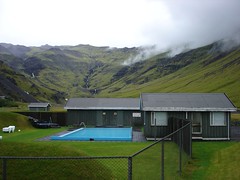
When I first got into the swimming pool industry I knew nothing about electricity other than the fact that it scared me. I had heard stories about people getting zapped while getting in or out of a swimming pool but I didn?t really believe it could happen until it happened to me one day. My first instinct was to think that something was wrong with the swimming pool I just built. I spent hours looking for nicked?wires that went to the pump and filter equipment. I even went as far as digging up the grounding wire that we buried with the plumbing that went around the swimming pool to make sure we didn?t break it. Still, after days of searching I found nothing and was forced to call out our electrician. They went through the same series of events that we did before they arrived only to arrive at the same conclusion. Nothing on our swimming pool was causing the shock sensation, the current was in the ground.
Who could imagine that electricity occurs naturally underground.
The first time our company built a swimming pool with an electrical ground issue was when we built a polymer ?wall vinyl liner swimming pool. This almost didn?t make sense to me because we built almost an identical swimming pool just three houses down on the same side of the street. The difference was the other pool was a steel wall structure and that the pool practically grounded itself. Two weeks and almost two grand later the power company traced the problem back to a water heater in someone?s home ten houses up the street. This poor guy who didn?t even want a swimming pool and he?had the electrical company tearing up his yard looking for the mysterious leak. A day later they were inside his home narrowing down the problem?and told him to fix the problem. If you have never seen the power company doing their thing trying to find a problem then you won?t ?know why we call it the Circus! I?ve never seen some many trucks with flashing lights and employees running around with bright colored vests and hats other than when I have taken my kids to see the Circus. Nonetheless, problem solved!
Another time the same issue rose again, but this time it was a fiberglass swimming pool and all of the power lines were above ground. By this time national codes had changed and we were so much wiser. The 2005 national code book called for what was called the Equipotential Bonding Grid. Don?t worry, it took me about two months to figure out how to pronounce that. Basically the code book called for a wire mesh mat to be placed around the swimming pool. It kind of looks like big grid chicken wire that?s about 3 feet wide and the wires were welded together to make 1 foot by 1 foot squares. The kicker was that everyone said the grid had to be made of solid copper and during the 2008 season a 100 foot roll of this material cost between $ 550 to $ 800 depending on the cost of copper. It was expensive but it did the job.?
These days some localities are still using the 2005 code book and there have been changes to the Equipotential Bonding Grid code in the 2008 national code book. It can be confusing and subject to interpretation but basically my view on it is that they are still asking for the grid but they are now allowing the grid wire to be made of steel instead of copper. Don?t use chicken wire though, the code inspectors do want to see the heavy gage wire like you see going into concrete for reinforcement.? In all cases, make sure the pool has at least a solid #8 copper ground running from the house to your swimming pool. Make sure that this wire is securely fastened to your grid wire in at least 3 places around the pool, the more the better.? Also remember that every time you lay down a new sheet of grid wire that it needs to be securely fastened to the one before it. I prefer to see solid copper split bolts making this connection even though some inspectors will allow steel tie wire. My thought on that is that tie wires are thin and will eventually rust through. If that happens you will eventually have a break in your grounding grid and this will become a kink in your armor.
When all else fails, refer to your local building inspector for advise along with that of an electrician who specializes in the wiring of swimming pools. Pull some valuable professional experience from this article and then make your best educated decision. But please remember this, being cheap in this department can cause you, your family and guests problems later. It is truly better to be safe than sorry.
In the event you have a professional pool builder hired to install your swimming pool, take the time to discuss this issue. Keep in mind that he or she may have a difference in opinion about this subject but stand firm on the issue. If they object because of cost, kill the subject by telling them that you will cover the cost if they don?t have it built into the quote they provide you. Money should not be an issue when it gets down to safety.
Find More Swimming Pools Articles
overeem laron landry mary j blige burger king islands ryan seacrest wonderlic test joe flacco
No comments:
Post a Comment
Note: Only a member of this blog may post a comment.